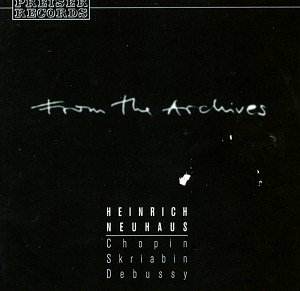AVAILABILITY
www.preiserrecords.at
Heinrich Neuhaus (1888-1964)
never had much of a concert career (he
suffered from bad stage fright) and
made his reputation as a teacher. Heís
thus fated always to be noted as Richterís
master but the list of his other pupils
is not short of distinguished names;
Emil Gilels, Radoslav Kvapil, Radu Lupu,
Stanislav Neuhaus and Igor Zhukov amongst
many. Neuhausí pedigree was impeccable.
Born in Elisavetgrad he was himself
a pupil of the distinguished Michałowski
and later studied in Vienna with Godowsky.
He was later still a professor
at the Moscow Conservatory from 1922
until his death. Worth mentioning also
is the little matter of his being the
cousin of Blumenfeld and distant cousin
of Szymanowski.
Iím no expert on Neuhaus
discographically so should mention that
Preiser note these rather murky sounding
78s as having been recorded "in
the 1940s". Though not a soloist
as such he did make records and this
selection gives one a reasonable over-view
of his sensibility and also his repertoire,
because he was selective as to what
he played. His Scriabin alas is confined
to the Two Poems Op. 61, tiny slivers
of pieces, and the bulk focuses on his
Chopin and Debussy. Of the former he
lavishes most time on the Mazurkas and
itís instructive to see what he makes
of them in relation to a contemporary
such as Rubinstein. In general Neuhaus
is quicker and rhythmically tighter,
with less rubati and fewer inflexions.
In the B minor his rhythm is less sprung
and heís perhaps less steady as well,
whereas in the E minor (Op. 41 No. 2)
he shows few of Rubinsteinís little
intimacies preferring instead a straighter
and more determined trajectory. In the
C sharp minor from the Op. 63 set his
urgency and emotive pull contrasts with
Rubinsteinís more delicate refinement
Ė the characterisation is entirely distinctive
in both these performances and profoundly
different.
Neuhaus tends to etch
the Mazurkas more graphically and can
also be more unsettled and unsettling
(see the C minor Op. 56/3 for an explicit
example) whereas Rubinsteinís more relaxed
tempi enable him to exploit maximal
contrasts of material. In the main Neuhausís
directness is a characteristic of his
Chopin pianism. In Debussy similarly
he tends to be colouristically less
demonstrative than say Michelangeli
and rather more linear. In Les Collines
díAnacapri for example whilst full
of drama in Neuhausí recording, comparison
with the younger Italian will show contrasts,
fissures and visceral dynamism that
Neuhaus barely hints at. Nevertheless
one can only but profit from listening
to Neuhaus.
The recordings sound
rather muddy and congested. No transfer
engineer or process is noted and Iím
not sure if these were transferred from
78 or from a subsequent LP transfer,
though they may reflect the boxy acoustic
of the Moscow studio all too well. I
have a feeling they could be opened
out with advantage.
Jonathan Woolf
